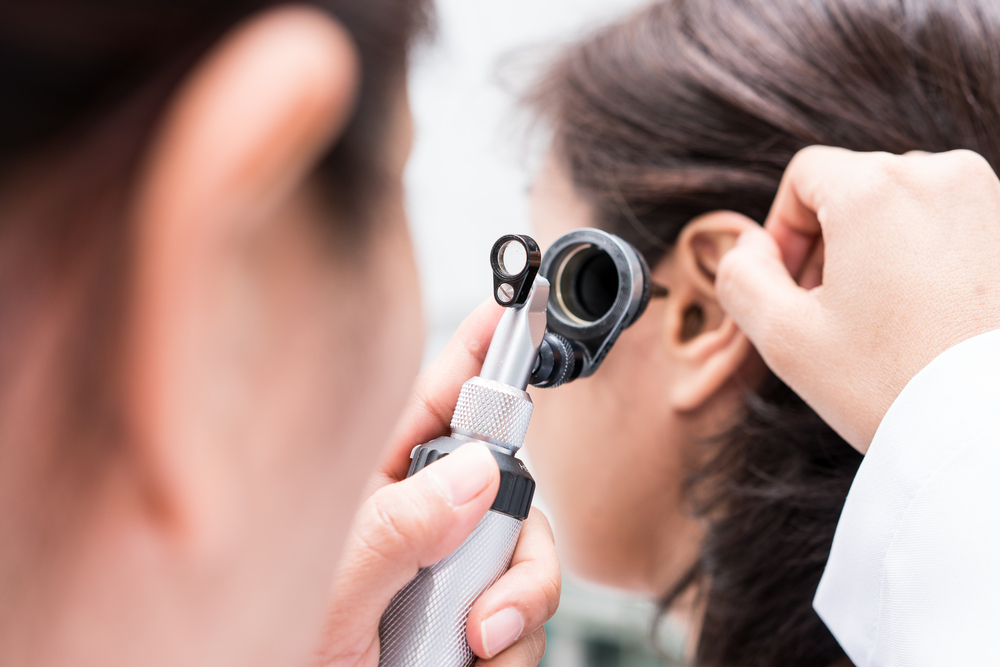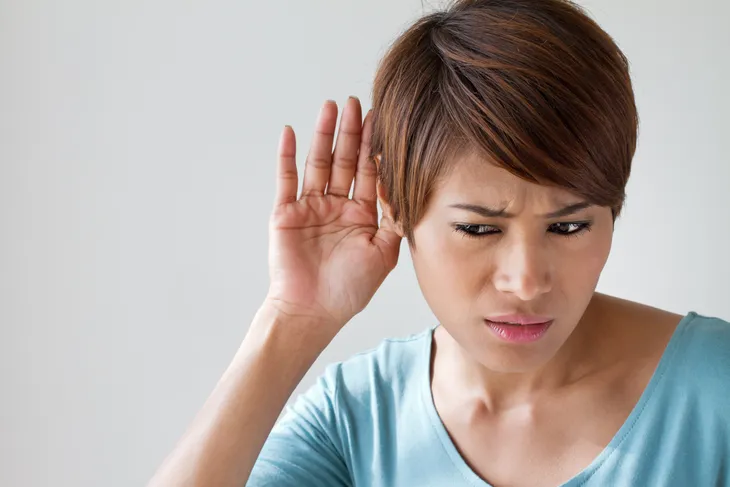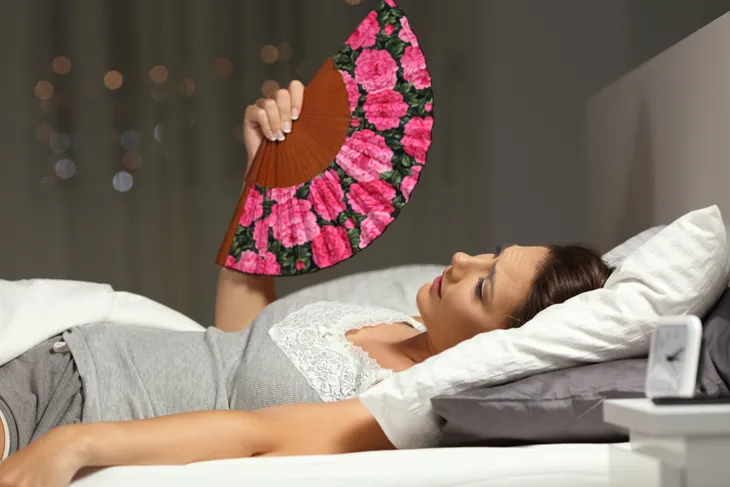If you’ve ever suffered from an inner ear infection, you know how debilitating it can be — and Meniere’s disease is no different. According to the Mayo Clinic, Meniere’s disease affects the inner ear and causes bouts of vertigo (dizziness or “the room spinning”) due to fluid that fills the tubes of your inner ears. On top of the dizziness and nausea, flare ups can also cause some loss of hearing in one or both ears and a constant ringing sound. You might not be able to drive, work, or do regular daily activities at times, although this chronic condition varies greatly from person to person. Unfortunately, the disease is not curable, but there are many treatment options that can help successfully manage the disease.
Keep an eye out for these ten signs and symptoms of Meniere’s disease, and see your doctor if you experience any of them…
1. Dizziness
Meniere’s disease often isn’t diagnosed early on because you may only experience one symptom — dizziness — in the beginning, making it difficult for your doctor to link it to the disease. Dizziness can be caused by a lot of different diseases and infections, but it’s one of the main symptoms associated with Meniere’s disease. It’s also a very inconvenient and annoying symptom to have to deal with, and could have an unfortunate effect on your daily life.
Your inner ear is responsible for your balance, and since the disease attacks the tubes in your inner ear, dizziness is bound to occur when experiencing a flare up of the disease. If you experience dizziness as a result of an attack of Meniere’s disease, it may cause you to be unsteady on your feet and feel like the world is moving unsteadily around you. In severe cases, dizziness can make you fall over or trip while walking, making it dangerous to be driving, working, or simply walking.
2. Nausea
Nausea is another common symptom of Meniere’s disease, and it’s not surprising that you would feel nausea along with dizziness. Feeling sick to your stomach and actually vomiting can easily occur when you’re experiencing severe dizziness as well. Some symptoms of Meniere’s disease are grouped together, especially nausea and dizziness, because the disease causes vertigo. Therefore, these symptoms go hand in hand, although it is possible to only experience one symptom during attacks.
When attacks of the disease come on, symptoms of vertigo are felt for as little as half an hour to as long as a full 24-hours. Although these attacks are seemingly short-lived, nausea and other symptoms can be felt strongly during the whole flare up. Although a symptom like nausea is extremely inconvenient and unpleasant to deal with, there are over-the-counter medications for motion sickness and prescription anti-nausea medications that your doctor can provide that could greatly help manage the attack. There are also some antibiotics that can be injected into the ear to help relieve symptoms if necessary.
3. Hearing Loss
One of the scarier but also common symptoms of Meniere’s disease is hearing loss in the affected ear. Although usually temporary and in one ear, permanent hearing loss happens to some over time and a somewhat small group of people will experience it in both ears. Many patients describe the hearing loss as if their ear is plugged—sound can seem distorted, fuzzy, far away, or even tinny. Sensitivity to sound is also common, and finding a way to successfully remove the fluid helps improve any hearing problems the patient suffers from.
Removing and decreasing the amount of fluid in the tubes of your inner ear is done in a variety of ways and depends on the patient. Lifestyle changes and diuretic medications are often the first treatments to try. Cutting things like salt, caffeine and alcohol from your diet could naturally reduce your symptoms. Drinking lots of water could also be effective because your body won’t try to retain water when you’re well-hydrated, decreasing the risk of fluid build up. In severe cases, patients may require a hearing aid or even surgery if other treatments are unsuccessful.
4. Ringing In the Ear
Experiencing ringing in the ear is another symptom caused by Meniere’s disease. If you’ve ever had to deal with ongoing abnormal sounds in one or both ears, you know how uncomfortable, distracting, and grating it becomes. According to the Mayo Clinic, Meniere’s disease can cause tinnitus, unfortunate sounds in the ear described as ringing, hissing, roaring, buzzing or whistling. Since the disease affects people in different ways and with varying symptoms, some patients may experience tinnitus without vertigo and hearing loss or a combination of several symptoms.
While not painful, any sort of foreign sound such as ringing in the ear can be really difficult to cope with. Falling asleep and sleeping well can be far out of reach during a more severe attack of the disease. And it doesn’t help that these flare ups could happen as little as once a year to as much as several times a year and in clusters that cause many severe symptoms. You need help and treatment if you have Meniere’s disease, so see your doctor if you have any of the signs or symptoms.
5. Uncontrolled Eye Movements
Aside from the symptoms that the everyday person would connect to an inner ear problem, Meniere’s disease can also cause uncontrolled eye movements. Some people who have the disease experience a sort of jerky eye movement in one or both eyes, side to side, up and down, or in a circular motion. It varies depending on the patient and each attack. The inner ear directly affects balance, and in turn, the movement of your eyes. Tests are done to check the response of your eyes when your inner ear balance is changed.
This is yet another symptom that makes it unsafe to drive or operate any machinery when the attack comes on. The problem is, the symptoms caused by Meniere’s disease can come out of nowhere and catch the sufferer off guard. People with severe symptoms are likely to be ordered not fit to drive by their doctor. But if the disease can be better controlled and treated, it’s possible to live a normal life and do simple things—such as drive—again.
6. Diarrhea
Like the other signs and symptoms of Meniere’s disease, diarrhea could take you by surprise and occur out of nowhere. And those who experience diarrhea might be more likely to also be experiencing vertigo during the same attack. To make matters worse, diarrhea can continue to occur after flare ups, not just during them. This makes it very important for you to stay hydrated when you’re struggling to cope with this symptom of Meniere’s disease. Since vertigo can cause you to throw up, the combination of vomiting and diarrhea can make you extremely dehydrated and cause other health problems if not corrected.
Along with diarrhea, abdominal pain and other gastrointestinal discomfort is possible. That said, diarrhea is much less common than other symptoms, so you have fairly good odds of not having to deal with it. And there’s even better news, the help and expertise of a doctor makes the disease and subsequent symptoms quite treatable and manageable. You have good odds of generally feeling well.
7. Cold Sweats
When in the middle of an attack, people who experience symptoms—nausea, dizziness, and even vomiting—could also develop cold sweats, adding another uncomfortable symptom to deal with on top of everything else. Since cold sweats are typically a result of vertigo in the case of Meniere’s disease, vertigo medication could eliminate or greatly reduce this and other vertigo symptoms. Depending on how severe your episodes are, your doctor may prescribe an anti-nausea medication to reduce the harmful symptoms of the attacks.
Along with cold sweats, you may notice your pulse slow down or speed up, and you’ll begin to tremble. This makes it difficult and sometimes impossible to go about your work and daily life. It’s best to lie down during attacks like this to prevent hurting yourself. You could throw up from the vertigo and begin the cold sweats at that time or simply as you rest and try to cope with severe symptoms. Whether you’ve been diagnosed with Meniere’s disease or not, these frightening symptoms should be taken very seriously and examined by your doctor.
8. Feelings of Fatigue
While there are several mild to severe symptoms that you can experience before and during an attack of Meniere’s disease, there are also quite a few signs and symptoms you might have after the attack. Feelings of fatigue is one of these common symptoms, and the lethargic and sleepy feelings can be extreme. It’s thought that those with Meniere’s disease are more sensitive or susceptible to fatigue, increasing the risk of falling prey to an attack.
Also, fatigue could be what causes flare ups, so people with the disease should adjust their lifestyle as needed to reduce the risk of becoming too tired. Work on sleeping well and not over-working or over-extending your capabilities, and identifying how you feel and sharing this information with your doctor could speed up the process of diagnosing what’s causing your symptoms. Make sure when you go to your doctor that you describe what you feel before a flare up of whatever ailment you have, during the attack, and afterwards.
9. Extreme Mood Changes
Another symptom commonly felt after an attack is mood changes. People with Meniere’s disease have claimed feeling a variety of changes in their mood both during episodes and in between them, from anger and irritability to anxiety and fear. These mood swings and feelings of instability can be caused by many things, so they aren’t necessarily from Meniere’s disease. But if you have additional symptoms of the disease and experience flare ups and attacks where the symptoms worsen, see your doctor. It’s important to treat the disease as early as possible, to help reduce the risk of permanent damage.
It’s also worth it to note that mood changes and roller coaster-type feelings aren’t necessarily a physical reaction from the disease—the Mayo Clinic explains that it’s currently unknown if anxiety contributes to and causes episodes or if anxiety is a by-product of the disease, occurring after attacks. Either way, managing the changes in your emotional and mental state are necessary in order to increase your quality of life and help you cope with Meniere’s disease.
10. Migraines
A sign of Meniere’s disease that’s easy to overlook are severe headaches, specifically migraines. There are so many dietary and lifestyle causes of migraines that it’s no wonder this sign can be overlooked. That said, once you really think about the disease and what it attacks, it’s not so hard to see the connection. It’s thought that migraines can cause damage to the inner ear, and those with Meniere’s disease are more likely to get migraines during flare ups.
According to the American Hearing Research Foundation, people who experience migraines and have Meniere’s disease will begin showing the symptoms of the disease earlier on than those who don’t. This is also true for those who have a family history of the disease, suggesting a genetic connection to the increased risk of developing Meniere’s disease. It’s important to note that even though Meniere’s disease can cause migraines, there’s also the possibility that the migraines stem from what’s called migraine-associated vertigo, making it even more challenging to diagnose—and increasing the chance of misdiagnosis.













